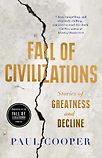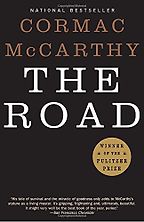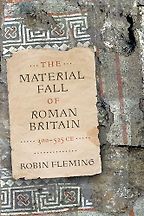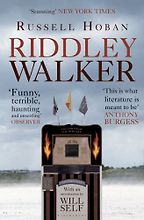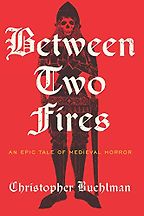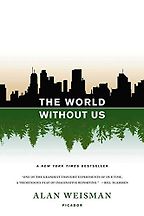Your work centres on themes of ruination, decline, collapse. And it seems you are not alone in this fascination: your podcast Fall of Civilizations has had 100 million listens; a related book, offering “stories of greatness and decline” is about to be released. For us, you’ve selected five books on the end of the world—presumably because for those experiencing dramatic cultural decline that’s how it must feel.
I began the podcast in 2019 with the intention of extending my PhD research into the significance of ruins and how they have been used culturally in art and film. I wanted to tell the story of how those ruins got there. As the podcast went on, the show’s focus became about trying to show what it felt like to live through these periods of immense upheaval and dissolution. As the first year of the show went on, we hit 2020 and Covid. People began to feel like they too were living through a period of upheaval, that the social fabric might be collapsing at times. And the show began to resonate with people on a deep level.
I started to get a lot of comments to the effect that it is comforting to hear that people in the past have been through events that were just as bad as what we were going through, and at times even worse—when it really felt like the end of days would come.
You’ve selected a mix of fiction and nonfiction. Shall we start with Cormac McCarthy’s The Road?
This is maybe a corny choice, as it’s very famous and widely read. But it’s a book that had a huge effect on me, and one I’ve returned to over the years. I first read it as a student, and I remember finishing this book while I was sitting on a train and weeping, and people looking at me, wondering if I was going through some kind of crisis. It was the first time I’d ever just wept at a book. It’s a strange feeling. And it made me think: this is what literature can do. This is the power it has.
I’ve read it several times in the years since then, and recently read it again as I’m going to become a father in the next month or so. I began to see that dimension of the book: that it is a book about the future, a book about the old world giving way to something new. And to me, that’s what I like to look at. For some people, the collapse of the Roman Empire or the end of the Egyptian Old Kingdom, the fall of Angkor in Cambodia, felt like the end of the world. But it was also the beginning of a new world. There’s always something that sprouts out of the ashes of devastation.
Yes, most of these post-apocalyptic books bring some sense of renewal or redemption in some way.
There’s a hope in it. Once you have abandoned hope that the present can continue, you make way for new hope that something better, more sustainable might take its place. Even if that is in the next generation.
You mentioned the fall of the Roman Empire. Your next book recommendation is Robin Fleming’s The Material Fall of Roman Britain, 300-525 CE, which you’ve said “offers a wonderfully evocative description of the collapse of Roman Britain.” For those who are not familiar with this period, would you give us a quick overview before we talk to the book itself?
Yes, as a bit of background: at the end of the fourth century, the western Roman Empire is one half of a Mediterranean-spanning empire that has turned the Mediterranean Sea into a Roman lake. It has survived for centuries, gone through multiple crises. But by the start of the fifth century it starts to come apart. This is a very complex process that happens in different ways in different parts of the empire. If you lived in Constantinople or Egypt, in the eastern empire, you probably wouldn’t notice any difference. You might see some refugees from the west, nothing more. If you lived in Gaul or Italy, you’re going to see upheaval, violence, warfare—but nothing out of the ordinary for the late Iron Age. But in Britain, partly due to its unique geography as an island, you see a much more dramatic collapse of the social fabric.
Entire industries fall apart overnight. Things like pottery, metalworking—industries that were supported by the Roman economic system—as Britain’s connections to the mainland are suddenly severed. Almost the entire urban culture of Britain falls apart in a matter of decades.
Robin Fleming is a brilliant historian who works in the US. She looks at how this played out on the level of objects, the real material culture of Britain. She brings up fascinating little details, like the fact that after the collapse of the Roman Empire in Britain, people stopped eating stew. They were simply no longer making the large earthenware or iron pots you need to make it. The loss of connection to Roman market gardens meant that coriander, parsley, and so on disappeared from the British diet too, and were replaced by native herbs that had been foraged.
“We don’t need to go to science fiction to see how the world ends. We can go back and see how it happened in history”
People began to scavenge in towns like Londinium and Colchester. And since metal was no longer being mined or processed at scale, they set to work scavenging the ruins of these ghost towns where the streets would have been completely overgrown, looking for metal that could be repurposed and melted down. You started to see people drift back to the ancient Iron Age hill fortresses where they had lived before the arrival of the Romans. As they did, they brought with them heirlooms and treasures they had taken from the ruins of the Roman towns: bits of patterned pottery, for example, that they treasured and passed down through families. The chiefs would still be eating off Roman silverware.
So you get a remarkable sense of how—as I have always tried to evoke—we don’t need to go to science fiction to see how the world ends, but we can go back and see how it happened in history. I tried to write my own book in an accessible style, so people can come to it with any level of historical knowledge. Although I hope I give a new angle that historians will enjoy too.
I also wanted to look at material culture—in Cambodia, with the Khmer, what happened when the silk cotton trees started taking root in the stones, what did the process of a temple like Ta Prohm decaying and deteriorating look like in the real world? And to see that kind of dissolution and ruination as a natural process that has its own beauty as well.
You mentioned speculative fiction—might that lead us neatly to Russell Hoban’s Riddley Walker? It’s also set in a post-collapse Britain, but a fictional one. It’s also written in an imagined vernacular. Tell us more.
This is an absolutely amazing book. Actually, I have a slight personal connection to it. When I lived in London and was working as a jobbing journalist, trying to get internships, I did get an evening job as the archivist for Russell Hoban’s estate. This was a remarkable period of my life. I was working in central London nine-to-five, then taking the District line to Fulham three nights a week where I would sit in the room where Hoban had died a year or two earlier. This room was full of his presence, full of all of his obsessions—like the Assyrian lions and Punch & Judy puppets that appear as motifs throughout his work. There was a huge relief map where he had clearly mapped out exactly how the sea level rise in Riddley Walker would have affected England.
See, the book is set in this futuristic version of Kent, which has turned into an archipelago. As you mentioned, it’s written in a kind of English that has gone through a process of ruination similar to the environment he describes. Everywhere, people are like the scavengers of Roman Britain. They are picking through the ruins of a past civilisation—picking part train carriages and things for the metal to reuse. In this world of rusted metal and deteriorated landscape, language itself is also coming apart. Sometimes it is barely recognisable. It takes a little while to get used to.
Ever since I read this book, whenever I see headlines about the decline in living standards I feel a terrible dread. Is part of the horror of books like this the idea that we might be one of those generations that experiences decline and fall?
Yes, that’s the fear, isn’t it? That we live in a world where the future isn’t going to be brighter and more prosperous. We do live in a time where it feels like things are coming apart, where the processes by which our society gained affluence and prosperity have now become liabilities and are beginning to work against us. But we are unable to change. The fear is not only that we don’t have the will to change direction but that it might not actually be possible. That nobody is holding the levers that can make environmental disruption stop, that will reduce inequality, or any of the things we really need when we imagine a future that is better than today.
Right. One of the main takeaways I got from your own book was how often climate change has already been a factor in the sudden dissolution of enormous empires.
It’s an interesting commonality you see in a lot of these stories, but it’s good to introduce a note of caution. There’s a famous observation that every generation has seen its own fall of Rome. I shared a list on Twitter recently made by German historian Alexander Demandt, of all the hundreds of causes that, over the centuries, have been attributed to the fall of Rome. From despotism and plutocracy to vegan diets, moral decay, feminism, all kinds of nonsensical things. So it’s good to avoid over-emphasizing the role of climate in these societies, just because it’s our preoccupation at the moment. But it’s undeniable that in so many of these situations, whether it’s the Sumerians—who, in the second millennium BC, saw a rapid desertification of their environment and salt build-up in the soil—or the Assyrians—who also saw a brief period of climate change that set them at a disadvantage to their neighbours at a crucial moment—or the Maya—who went through what has been termed a ‘mega-drought’ right before their society dissolved and dozens of cities were abandoned – many of them underwent some kind of climate shock.
In my view, societies are a kind of machine. They are a system that is designed to solve the problem of survival, to produce the necessities of life that enable populations to flourish and expand. But they are also machines that have been tailored very specifically to a certain environment. When that environment shifts too drastically, the machine stalls and begins to break down, and you see a cascading collapse as different parts of the system collapse in turn. This is how you end up not just with a gradual decline but a sudden thunderclap, where entire urban centres are abandoned.
We spoke to Max Porter a few years back. He picked Riddley Walker as one of his favourite books of all time, and talks about the ‘horror’ of this book. Is that how you see it?
I think so. But it also has a kind of cheeky sense of humour. The entire society has devolved to the extent that the greatest artistic production is Punch & Judy shows, where stories of the nuclear war are played out with puppets. Because the narrator is so matter of fact about what has happened, we do get a sense that life will go on no matter what happens.
I suppose the term can be more accurately applied to your next recommendation. This is Between Two Fires by Christopher Buehlman, a medieval horror set in the time of the Black Death which was also recommended to us recently by the fantasy novelist Richard Swan.
This is a really interesting book. It had quite an unconventional publishing journey, but it became something of a cult hit. It’s not a traditional post-apocalyptic book, but it tells the story of an excommunicated knight turned brigand. He comes into the company of a young girl who might be a saint, and they travel through medieval France during the Black Death. The whole book is like walking through a Hieronymus Bosch painting. You have a chaotic, magical disintegration of the world, which everyone is absolutely sure is the end of days. We, the readers, know it is just a plague, that things are going to continue. But the characters feel like everyone is going to die: the end of the world has come.
The whole book is like a fever dream, a dark grail quest where they move from one place to another, all beset with magical monsters. There’s one really memorable scene in a spectral castle where they go to a horrific feast where people are eating monkey brains. There’s a real sense of something chilling happening before they wake up and the castle has disappeared. It’s a marvellous book about people going through the apocalypse and coming out the other side.
Thanks for this recommendation. This merging of the fact and fiction reminds me of how, when you research societal collapse, you often find historical accounts preoccupied with prophecies and other modes of doomsday thinking.
A common thread in human reactions to these kind of apocalyptic events is the desire for it to have been prophesied. When the Spaniards arrived on the coast of Mexico in the early 16th century, the Aztecs or Mexica said they had seen a comet—appearing blood red like a flame in the sky. And in the mountains of Peru, the Inca also said the arrival of the Spanish had been prophesised by various signs—that an eagle had been attacked by condors in the main square in Cusco. If we can place these incomprehensible occurrences within a kind of cosmic logic, if we can say: it was prophesized and then it happened, we can make sense of it. When the fall of Constantinople occurred, they are supposed to have seen some kind of eclipse of the moon—it’s a bit hard to understand what they are describing. They say the moon was supposed to be half full but that it rose as a crescent.
I find it very interesting. And kind of touching as well. One of the things that struck me most about the Sumerians, the earliest culture I look at in the book—they thrived from about 3000BC to 2000BC—was that, in the final years of the empire they were visited by the comet Hale-Bopp, which I remember seeing as a seven-year-old in 1997, standing outside in the garden with my dad. It travels on this huge elliptical orbit that goes outside of the solar system. The last time it had passed by was during the reign of King Shar-Kali-Sharri, one of the final kings of the Akkadian Empire. It made me feel connected to those ancient people who had seen this very same comet pass by.
Right. That sense of being at the same point in a huge cycle of humanity. I think we do have a fascination with forecasting our own demise. Alan Weisman, the author of your final recommended book about the end of the world, The World Without Us, has gone much further than most in investigating what that might truly look like.
I absolutely love this book. It’s a wonderful hybrid of speculative nonfiction, nature writing, science. The World Without Us describes what would happen not if human society collapsed but if humans simply disappeared overnight. Say some disease wiped out all humans or, you know, an evil wizard snapped his fingers and humans disappeared. He moves meticulously around the world—through different environments, from cities to suburbs, different materials—and asks what would happen next. How long would it be before our warm, dry, comfortable houses deteriorated? Before trees grew up through the motorways and buddleia colonised the streets?
There’s an abandoned house on my road, an old row of Victorian terraces. One of the houses, quite strangely, has been derelict for three years or so. Local rumour has it that the owner has some kind of painful association with the house. They don’t want to sell it but they also don’t want to live in it. It’s amazing to see, among all these houses, this one where ivy is pushing through the doors and an old Christmas tree thrown out into the garden has taken root and is now growing. It’s almost a window into what the whole street could look like if it were abandoned one day.
This idea of the end of the world, or the collapse of civilisation, seems to press a little button in our brains.
It’s a very ancient impulse. In the epilogue of my book, I try to do this: to look ahead at what the collapse of modern industrial society might look like. Obviously the enormous challenge we are facing in the next century is climate change. That really overshadows all other threats. We are probably looking at widespread ecological damage that may result in cascading collapse, runaway climate change. Our society may simply not be resilient enough. It may not be a thunderclap collapse, it may be a kind of slow deterioration, a coming apart of what we think of as the world.
It’s important that people are clearheaded about this: that the machine that we have built that is our modern industrial society is a machine that will destroy the world if it is allowed to continue. The question is whether it is dismantled in an unscheduled, chaotic manner or whether it can be dismantled purposefully and safely. It’s like we are flying on a rocket and trying to dismantle it at the same time. It’s an incredibly dangerous situation.
Interview by Cal Flyn, Deputy Editor
April 21, 2024
Five Books aims to keep its book recommendations and interviews up to date. If you are the interviewee and would like to update your choice of books (or even just what you say about them) please email us at [email protected]
Five Books interviews are expensive to produce. If you've enjoyed this interview, please support us by donating a small amount.

